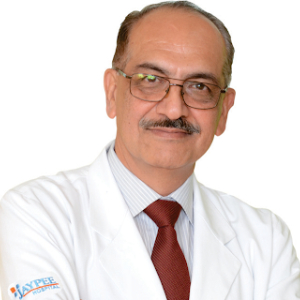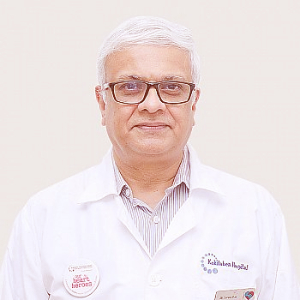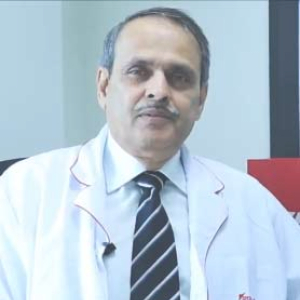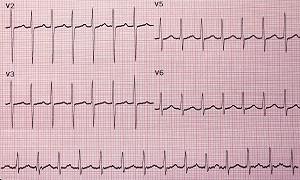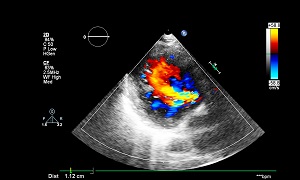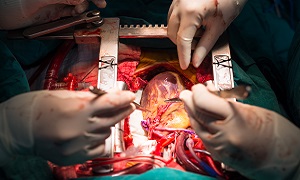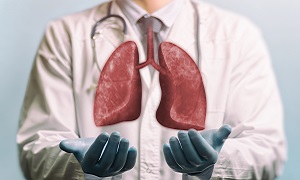Best Doctors in India for Pulmonary Hypertension Treatment
- Cardiac Surgeon, Noida, India
- Over 30 years’ experience
Profile Highlights:
- Dr. Manoj Luthra is a highly experienced and renowned Cardiac surgeon who has 30+ years of experience and performed the first heart transplantation surgery in the Indian Armed Forces.
- Till date, Dr. Manoj Luthra has performed more than 12,000 cardiac surgeries including 8000 heart bypass surgeries. He has also performed many heart transplants and aneurysm surgeries.
- Pediatric Cardiac Surgeon, Mumbai, India
- Over 33 years’ experience
Profile Highlights:
- Dr. Suresh Rao is a highly experienced cardiac surgeon specializing in congenital heart diseases and has performed more than 12,000 surgeries for congenital heart diseases and disorders.
- Dr. Rao holds an extensive experience of over 33 years in Pediatric and congenital cardiac surgery and has performed numerous simple and complex heart defect surgeries with successful outcomes.
- Dr. Suresh Rao introduced the Modified Ultrafication procedure after congenital heart surgery in India and has used the procedure in the treatment of a large number of pediatric as well as adult patients.
- Cardiac Surgeon, Mumbai, India
- Over 30 years’ experience
Profile Highlights:
- Dr. Suresh V Joshi is a cardiac surgeon in Mumbai with expertise in undertaking complex surgeries as a result of congenital heart diseases.
- He holds an extensive experience of over 3 decades in cardiac surgery and specializes in Coronary Artery Bypass Grafting (CABG); specifically Beating Heart CABG and Minimally Invasive Cardiac Surgeries.
- He is an expert in all kinds of coronary and interventional cardiac procedures and has performed over 15,000 cardiac surgeries for different kinds of heart defects and disorders.
Best Hospitals in India for Pulmonary Hypertension Treatment
Fortis Escorts Hospital, New Delhi
- City: New Delhi, India
Hospital Highlights:
- Over the last 33 years, the Fortis Escorts Heart Institute has set new standards in cardiac treatment with groundbreaking research. It is now known around the world as a centre of expertise for Cardiac Bypass Surgery, Interventional Cardiology, Non-invasive Cardiology, Paediatric Cardiology, and Paediatric Cardiac Surgery.
- The hospital has cutting-edge laboratories that perform a wide range of diagnostic tests in Nuclear Medicine, Radiology, Biochemistry, Haematology, Transfusion Medicine, and Microbiology.
- Fortis Escorts Heart Institute boasts a diverse group of bright and experienced doctors who are backed up by a team of highly qualified, experienced, and devoted support professionals as well as cutting-edge equipment such as the recently installed Dual CT Scan.
- Approximately 200 cardiac doctors and 1600 personnel currently collaborate to manage over 14,500 admissions and 7,200 emergency situations each year. The hospital now has a 310-bed infrastructure, as well as five cath labs and a slew of other world-class amenities.
Rela Hospital, Chennai
- City: Chennai, India
Hospital Highlights:
- RIMC is a multi-specialty hospital in a sprawling area of 36 acres located in Chromepet, Chennai, Tamil Nadu, India.
- The facility has 450 beds including 130 critical care beds, 9 operating rooms, modern reference laboratories and radiology services, and is conveniently located near road, rail and air transportation.
- RIMC is led and managed by world-renowned physicians committed to healthcare.
- RIMC offers the broadest range of clinical care, education, and research. The hospital offers state-of-the-art technology and modern treatment facilities designed to provide health care at an affordable cost.
- Rela Institute is driven by patient needs, comfort and confidence.
CARE Hospitals, Hyderabad
- City: Hyderabad, India
Hospital Highlights:
- CARE Hospitals were established in the year 2000, by CARE Group.
- The multispecialty hospital has 435 beds, including 120 critical care beds, with an annual inflow of 180000 outpatients and 16,000 in-patients.
- The hospital provides specialty medical services in Cardiology, Cardiothoracic Surgery, Pediatric Cardiology, Pediatric Cardiothoracic Surgery, Neurology, Neurosurgery, Nephrology, and Urology.
- The hospital has the first dual source, 128 slice CT scanner (for high precision cardiac imaging) – the first of its kind in south India.
- The hospital offers a wide range of accommodation facilities for the convenience of its varied patient base, ranging from general wards to super deluxe rooms.
Fortis Hiranandani Hospital, Mumbai
- City: Mumbai, India
Hospital Highlights:
- Fortis Hiranandani hospital was established in 2007.
- The hospital is an advanced tertiary care, multi-specialty hospital equipped with 149 beds.
- The hospital is equipped with a super ICU to provide emergency medical care to critically ill patients.
- The hospital is NABH accredited.
- The critical care facility in the hospital is augmented with the state-of-the-art facilities that facilitate speedier diagnosis and efficient monitoring.
- The hospital provides specialty medical services in cardiology, orthopedic science, pediatric science, neurology, diabetic care, urology, nephrology, ENT, obstetrics, gynecology, cosmetic surgery, bariatric surgery, neuro and spine care.
Fortis Hospital, Anandpur, Kolkata
- City: Kolkata, India
Hospital Highlights:
- Fortis Hospital, Anandapur, Kolkata is a world-class super-speciality equipped with the latest technologies in the medical world.
- The hospital is NABH accredited.
- This state-of-the-art facility specializes in cardiology and cardiac surgery, urology, nephrology, neurosciences, orthopaedics, digestive care, emergency care and critical care.
- The hospital, governed by integrated Building Management System (IBMS), has a pneumatic chute system, for quick vertical and horizontal transportation between floors, facilitating speedy transfer of patient specimens, documents, reports, and medicines to the concerned departments.
- The hospital also has a nephrology department with over 28 advanced dialysis units.
Fortis Hospital Banerghatta, Bengaluru
- City: Bengaluru, India
Hospital Highlights:
- Fortis Hospital Bannerghatta, Bengaluru was established in 2006.
- The hospital is a 276 bedded multi-specialty tertiary care facility.
- The hospital specializes in cutting-edge medical technology and dedicated patient care services.
- The hospital is equipped with state-of-the-art technologies like trans-radial angioplasty, trans-abdominal cardiac surgery, and computerized TKR navigation surgery.
- The hospital provides specialty medical services in cardiology, cardiac surgery, orthopedics, neurology, neuro-surgery, GI, and Minimal Access Surgery (MAS).
Fortis Hospital, Malar, Chennai
- City: Chennai, India
Hospital Highlights:
- Fortis Malar was established in 1992 and was formerly known as Malar Hospital.
- The hospital specializes in cutting-edge medical technology and dedicated patient care services.
- The hospital is multi-specialty, tertiary care facility with 180 beds.
- The hospital offers comprehensive medical care in specialties such as cardiology, cardio-thoracic surgery, neurology, neurosurgery, orthopedics, nephrology, gynecology, gastroenterology, urology, pediatrics, and diabetes.
Gleneagles Global Hospital, Parel, Mumbai
- City: Mumbai, India
Hospital Highlights:
- Gleneagles Global Hospital The 450-bed facility comprises of 17-stories, housing state-of-the-art infrastructure, and advanced medical care facilities.
- The hospital offers end-to-end clinical, surgical, and diagnostic services. It is equipped with a team of eminent medical professionals aided by qualified nurses and medical staff
- The Hospital offers advanced Endoscopic procedures, Hepatobiliary and Liver Surgeries, Surgical and Medical Gastroenterology, Bariatric Surgery, and Robotic surgery.
- The hospital is a center of excellence for Orthopedics, Joint Replacement, Knee Replacement, and Hip Replacement surgery.
Jaypee Hospital, Noida
- City: Noida, India
Hospital Highlights:
- Jaypee Hospital is the flagship hospital of the Jaypee Group.
- This hospital has commissioned 525 beds in the first phase and has been planned and designed as a 1200 bedded multi-specialty facility.
- It holds the accreditation of the NABH and NABL.
- The hospital has state-of-the-art infrastructure equipped with the latest technologies and modern equipment like 64 Slice PET CT, Dual Head 6 Slice SPECT CT, Gamma Camera, and Da Vinci Robotic Surgery for comprehensive robotic surgical solutions.
- It has special Centers dedicated to the major specialties to provide hassle-free and high-quality clinical care.
Manipal Hospital, Dwarka, Delhi
- City: New Delhi, India
Hospital Highlights:
- Manipal Hospitals, Dwarka, is a super-specialty hospital in Dwarka, New Delhi, which is a part of Manipal Hospitals Group.
- The hospital aims to provide the best treatment on par with international standards at a fraction of the cost.
- Equipped with 380 beds, the hospital is also one of the new age hospitals which are equipped fully with state-of-the-art infrastructure, cutting-edge technology as well as the latest and advanced clinical practices. The hospital also has 13 modular Operation theatres with 118 beds which are solely meant for critical care.
- The hospital comprises internationally acclaimed doctors and highly professional and experienced hospital and medical staff who are able to provide preventive, therapeutic, and diagnostic services all under one roof.
Pulmonary Hypertension
Pulmonary Hypertension is a type of high blood pressure that affects your arteries in the lungs as well as the right side of the heart. This condition is life-threatening and it generally gets worse over time. However, treatments can help you to lessen your symptoms so that you can live better with the disease. Although it may take some time, patients are generally able to live life normally, the way they did before their diagnosis.
In this condition, the tiny arteries in your lungs get narrow or blocked, which makes it harder for the blood to flow through them, which causes the blood pressure in your lungs to rise. This makes your heart work harder to pump blood through those arteries, and after a while the muscle of the heart gets weak. Eventually, it leads to heart failure.
Symptoms
The signs and symptoms of pulmonary hypertension develop slowly, and it takes take months or sometimes even years, for you to notice them. As the disease progresses, the symptoms get worse.
The symptoms of pulmonary hypertension include:
- Fatigue
- Chest pressure or pain
- Dizziness or fainting spells
- Swelling in your ankles and legs, and eventually in the abdomen
- Racing pulse or heart palpitations
- Bluish color to your lips and skin
Causes & risk factors
Sometimes your doctors are unable to find the reason for your high blood pressure in your lungs. In such cases, the condition is termed idiopathic pulmonary hypertension. Genes might play a role in why some people get this illness.
Sometimes, another condition can also lead to pulmonary hypertension, which can include any of these:
- Congestive heart failure
- Liver disease
- Lupus, scleroderma, rheumatoid arthritis, and other autoimmune diseases
- Blood clots in the lungs
- HIV
- Lung diseases like emphysema, chronic bronchitis, or pulmonary fibrosis
- Sleep apnea
- Illegal drug use
- A heart defect you’re born with
Having a family history of pulmonary hypertension, being obese or overweight, exposure to asbestos, taking illegal drugs such as cocaine, living at a high altitude, are some of the factors that can increase your risk of developing pulmonary hypertension.
Diagnosis
It is generally hard to diagnose this condition early as it is often not detected during a routine physical exam. Even when the condition is more advanced, this condition shows signs and symptoms that are similar to those of other heart and lung conditions.
Your doctor is first going to perform a physical exam and then talk to you regarding your signs and symptoms. You will be asked questions regarding your medical and family history.
Some of the tests that your doctor can order might include any of the following:
Blood tests
Chest X-ray
Electrocardiogram (ECG)
Echocardiogram
Right heart catheterization
Treatment
Pulmonary hypertension differs from person to person, and this is why your treatment plan will need to be specific to your needs. Generally, first, the doctor treats the cause of your condition. For example, if your problem is caused by another condition such as emphysema, then he/she will focus on treating it, to improve your pulmonary hypertension.
Many people also receive oxygen therapy, which is a form of treatment to improve their breathing. It can be extremely beneficial if you are short of breath, or if you have low oxygen levels in your blood. It can also help you live longer if you are having pulmonary hypertension. If you are at risk for blood clots, then your doctor might also recommend blood thinners.
Atrial septostomy
If medications don’t help your condition, then this open-heart surgery can be an option. This procedure involves your surgeon creating an opening between the upper left and right chambers of your heart, to relieve the pressure on the right side of your heart. It is to be noted, however, that this treatment may lead to serious complications, such as arrhythmia, heart rhythm problems.
Lung Transplant
In some cases, a lung or heart-lung transplant can be an option, especially for younger people who have idiopathic pulmonary arterial hypertension.
There are certain major risks to organ transplantation. This includes rejection of the transplanted organ, as well as a serious infection. You might also need to take immunosuppressant drugs for life in order to reduce the chances of rejection.
Complications
Some of the complications that this condition can lead to include:
- Right-sided heart enlargement and heart failure
- Arrhythmia
- Bleeding in the lungs
- Complications during pregnancy

